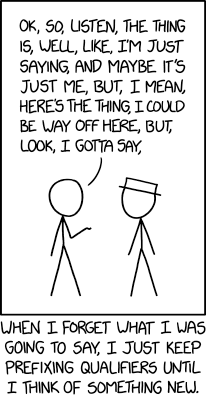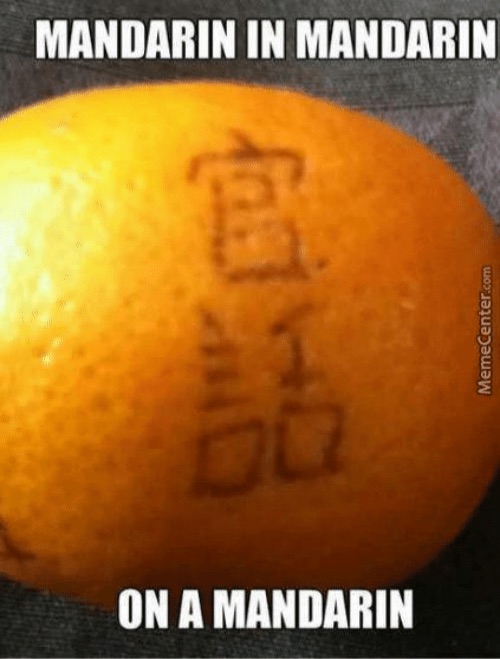Chinese language jokes
These are jokes circulating on the Chinese internet. Not all of them have to do with Chinese languages per se in the narrowest sense.
Mandarin
Guānhuà 官話 (lit., "officials' talk", "Mandarin")
Read the rest of this entry »
Cat names from GPT-2
Janelle Shane, "Once again, a neural net tries to name cats", 6/3/2019:
Last year I trained a neural net to generate new names for kittens, by giving it a list of over 8,000 existing cat names to imitate. Starting from scratch, with zero knowledge of English or any context for the words and letter combinations it was trying out, it tried to predict what letters might be found in cat names, and in which order. Its names ranged from the strange to the completely nonsensical to the highly unfortunate (Retchion, Hurler, and Trickles were some of its suggestions). Without knowledge of English beyond its list of cat names, it didn’t know what letter combinations to avoid.
So I decided to revisit the cat-naming problem, this time using a neural net that had a lot more context. GPT-2, trained by OpenAI on a huge chunk of the internet, knows which words and letter combinations tend to be used together on the English-language internet. It also has (mostly) figured out which words and letter combinations to avoid, at least in some contexts (though it does tend to suddenly switch contexts, and then, yikes).
Read the whole thing — with pictures! Apparently the Morris Animal Refuge is using this algorithm to name the animals it offers for adoption.
Read the rest of this entry »
Rating and judging non-native English
From Martijn Wieling:
We have created a questionnaire about rating English accents and judging English audio samples from non-native speakers of English. We'd like to get as many native English speakers as possible to provide their judgements about the audio samples and I was hoping you'd be willing to link the questionnaire.
Note that the survey link randomly redirects people to one of two questionnaires. One is about deciding which English word you hear (pronounced by a Dutch speaker), the other about rating the nativelikeness of English accents, similar to the questionnaire that you recruited subjects for in 2012 ("Rating American English Accents").
So all you native English speakers, please volunteer — the task just takes a couple of minutes: http://www.martijnwieling.nl/survey
The traits of a troll
Troll watch
WATCHWORD: When one goes fishing for trolls, the trolls are almost always certain to bite.
We've recently had a succession of posts on trolls (see "Readings" below). We all know that there are lots of trolls lurking out there all over the internet, and they are up to no good. They cause much mischief and disrupt otherwise interesting, productive discussions. They are especially destructive when they are the first to jump in after a post goes up and reflexively say something nasty and negative, without really having read the post and thought about what it's trying to communicate. Yet, it is clear that different people have different ideas about what exactly a troll is. So let us see if we can get some idea of or consensus on what constitutes trollishness in today's world.
Read the rest of this entry »
One law to rule them all?
Power-law distributions seem to be everywhere, and not just in word-counts and whale whistles. Most people know that Vilfredo Pareto found them in the distribution of wealth, two or three decades before Udny Yule showed that stochastic processes like those in evolution lead to such distributions, and George Kingsley Zipf found his eponymous law in word frequencies. Since then, power-law distributions have been found all over the place — Wikipedia lists
… the sizes of craters on the moon and of solar flares, the foraging pattern of various species, the sizes of activity patterns of neuronal populations, the frequencies of words in most languages, frequencies of family names, the species richness in clades of organisms, the sizes of power outages, criminal charges per convict, volcanic eruptions, human judgements of stimulus intensity …
My personal favorite is the noises it makes when you crumple something up, as discussed by Eric Kramer and Alexander Lobkovsky, "Universal Power Law in the Noise from a Crumpled Elastic Sheet", 1995 ) referenced in "Zipf and the general theory of wrinkling", 11/15/2003).
Contradicting the Central Limit Theorem's implications for what is "normal", power law distributions seem to be everywhere you look.
Or maybe not?
Read the rest of this entry »
An anecdote on the limitations of the Chinese writing system
[This is a guest post by Ari-Joonas Pitkänen]
I’m a frequent reader of Language Log, and I’ve been particularly interested in the debate about the usefulness / limitations of the Chinese script in modern society. As the 30th anniversary of the Tiananmen Square massacre approaches, I remembered an anecdote about the limitations of Chinese characters presented in Louisa Lim’s book The People’s Republic of Amnesia. It describes the way jailed activists communicated in prison after the crackdown on Tiananmen in 1989:
Read the rest of this entry »
Variant pronunciations of "posthumous"
Nick Kaldis asks about the pronunciation of "posthumous":
On NPR this morning, and once a few weeks ago, both announcers pronounced it "pōst-hyooməs"; I can't recall ever hearing this pronunciation before.
Read the rest of this entry »
Moby Zipf
A recent radio presentation: "The Law of Languages", Living on Earth 5/31/2019.
Other mass media: "Dolphins, aliens, and the search for intelligent life", Astrobiology 8/29/2011; "Dolphin Studies Could Reveal Secrets of Extraterrestrial Intelligence", 9/2/2011; To talk with aliens, learn to speak with dolphins", Wired 2/15/2011; "SETI Evolution: Searching for Aliens Using Whale Songs and Radios", Space.com 7/2/2013; "Dolphins Are Helping Us Hunt for Aliens", Nautilus 5/28/2018; "The Law all Languages Obey", Nova 9/26/2018; "Humpback Whale Communication and the Search for Alien Intelligence", SETI Institute 11/28/2018; "Humpback whales could hold the key to communicating with alien intelligence, say experts", Metro 12/6/2018; "What humpback whales can teach us about alien languages", Vox 12/6/2018.
Read the rest of this entry »
Spelling Bee 2019
I'll let this incredible ESPN (it's a sport, after all) video speak for itself:
Read the rest of this entry »
Not just any old Putonghua
No siree! These Hong Kong students are being taught to emulate Beijing government models:
In the 13rd [sic] Hong Kong Cup Diplomatic Knowledge Contest held on May 12, Hong Kong high school students militantly spoke perfect Putonghua. Their Beijing accent, tone, gestures, facial expressions all reminded one of China's Foreign Ministry Spokesperson Hua Chunying, or even Chairman Mao's wife Jiang Qing. E.g, a schoolgirl indignantly yelled, "Not a single country has fallen into a debt crisis as a result of joining the One Belt One Road!" (The fact, however, remains that due to their inability to repay debts to China, Zambia has lost to China its Kenneth Kaunda Airport and the ZESCO Power Plant; Sri Lanka has handed over its Hambantota Port to China on a 99-year lease; and Kenya is giving up its Mombasa Port to China.) Xie Feng, Commissioner of the Foreign Ministry of PRC in HKSAR, called upon the students to love the State of China and take up positions in international organizations like the UN. Critics suspect that quite a few HK kids are already thoroughly brainwashed by their pro-CCP education and may be used to infiltrate into American & other Western organizations.
Read the rest of this entry »



